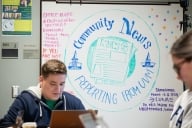You have /5 articles left.
Sign up for a free account or log in.
Washington University in St. Louis is downsizing some of its career fairs and flipping the traditional event structure around by asking employers to pitch their companies to a small group of students instead of having students approach employers.
At these career "slams," recruiters have 45 seconds to pitch their company to about 200 students. After the companies pitch, recruiters and students mingle. The goal is to create a comfortable environment where students are relieved of some of the stress associated with approaching employers at a traditional, multi-industry career fair, said Mark Smith, associate vice chancellor and director at the career center.
The setup puts the spotlight on recruiters and requires students to hear from all employers rather than picking and choosing which booths to approach as at a typical fair, said Madeleine Polk, a senior majoring in systems engineering and learning sciences. She attended a slam for students interested in working in science, technology, engineering and math fields and said she wasn’t as intimidated to talk with recruiters as she sometimes is at more formal events. She has since interviewed with four of the companies from the STEM slam.
In upcoming months, the university will hold slams focused on social impact, diversity and arts and communications jobs. The concept is adopted from the university’s IdeaBounce® events at the Skandalaris Center for Entrepreneurial Programs, where entrepreneurs give two-minute pitches to representatives from venture capital firms, incubators, faculty members and local entrepreneurs.
Washington University's STEM slam event was a “unique way” for employers to share a company’s message, said Trent Peterson, university relations manager at Netapp, a company that creates data management solutions. The pitch featured similar content to an email a company would send to students, but the slam provided a guarantee that students would hear the message. It was particularly beneficial for employers looking to hire students from a narrow group of majors, he said.
Smaller, niche career fairs work well for local or startup companies or for companies with a small number of positions open, said Lisa Severy, president of the National Career Development Association.
“There is still a place for big career fairs, but I love that we’re moving into different areas as well,” she said.
The University of Colorado at Boulder, where Severy works as director of career services, holds speed interviewing sessions a few times each semester. At the events, students talk one-on-one with recruiters for about five minutes before switching to the next company.
The number of four-year institutions offering specialized career fairs decreased from 54.8 percent in 2010 to 50.8 percent in 2012, said Edwin Koc, director of strategic and foundation research at the National Association of Colleges and Employers. In 2011, 55.4 percent of four-year institutions offered specialized career fairs. NACE’s survey asks institutions if they hold specialized fairs, but does not create parameters for the events, other than providing the examples of an "exploring majors" or a "liberal arts" fair.
Specialized career fairs work best for majors that lead to specific careers, like science, engineering, agriculture and education, said Paul Timmins, director of career services for the college of liberal arts at the University of Minnesota. When students’ majors “leave them open to a variety of careers,” general career events are more beneficial because they help students recognize different opportunities available, Timmins said.








